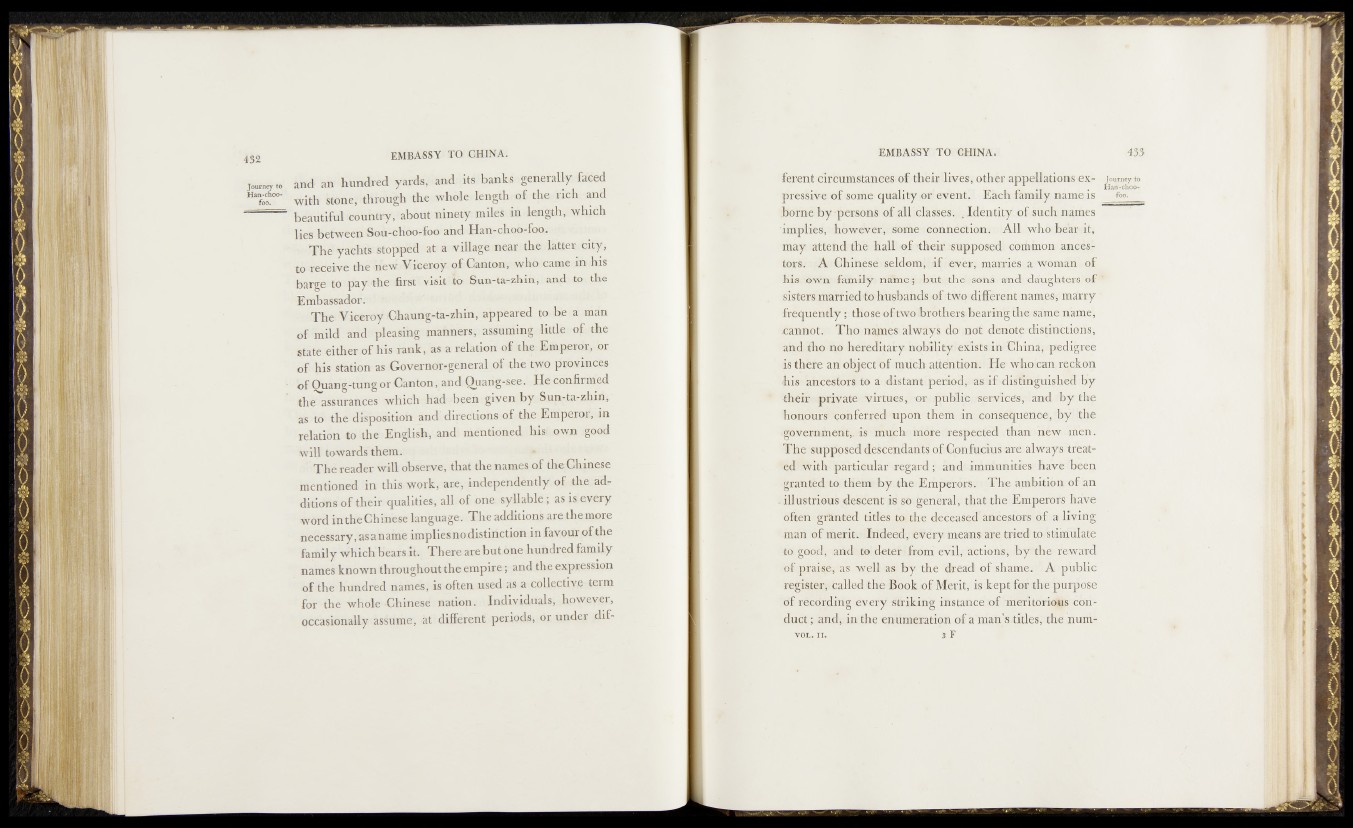
Journey to
Han-choo-
, foOig
and an h-undred yards, and its bank«, generally faced
w i* koae; through Aecwiwle.length of the rifch and
beantiful ifouhtry, about n in t^ w ii^ a » - lengthy- ise^db
lies between S<m-ch©orin®' and Han-choo-foo.
The yaehtS stoi^sd at a village near the latte».
to w e i ^ e the new Viceroy of Canton;-who. came in his
t e g e to p a y <the first Yisitlo Sun-Unzhin, and tp the
Embassador:
The Viceroy .Chaungrta-zhin, appeared to. be a man
®f %ild and pleasing, manners, assuming lit% ? o fth e
state either of his rank,, as a relation of the Emperor, .or
of his station as Governor-general of the two provinces
of Quang-tung or C an ton, an d. .Quan g-see. H e con firmed
th e assurances which had d>een gbre».- byu§»f»4»rEbiii,
as to the disposition and direotions ohihe Empeioif, in
relation to the la v is h , and mentioned hisl .own good
will towards them.
The reader will observe, that the nameSrOf theChinese
mentioned in this work, are, independently.of the additions
of their qualities, all.of one syllable; asH m v j
word intheChinese language. The additions are,themore
necessary, as aname impliesno distinction in favour pf the
family which bears.it. There are butone hundred family
names known throughout the empire; and the expression
of the hundred names, is often used as a collective-term
for the whole Chinese nation. Individuals, .how£Y£r:,
occasionally assume, at different periods, or under different
rcirbumstafieest o£ their 'lives /other appellations e ‘ ' , , ( . x- ,jo«ncy,to m H HH . r .IpgpaiaK
p re s si^ 'o f som'e quah tyjOyyksrfemt. * Each ramily n aniens
b^'mbby^©rs©®®h§|a'll!iel^lsgs’y., Idenbityf;ofBS,1i(!ibn.ames
'implies', jhow^erl^somie-i e^n©@triam hAU whohehnsit;
mayaattehd; the Kallf@f 4hddlswpposedi common-iancesr
tors. A:CMia&se*rs#idfDm\Mp'ever'
liis.-own fam ily nabie ^rbnttithdjsfflihb'atod dg|itgkte<Bs!of*'
si'Ster^mlaffied^(^hnsb;ar^fe^tW0%di'^|liLt nampstlnaairry *
frequently ;riH©s&'ofitw©lbr0fchersfb.eaKU3%'the¥s^m.^nrame',
oanuotsf T.ho navies, always dosnotti
and?iiho no ftereditaisy tydexfe tsbttfj@hin a, q^$i||roe
is thbfe anS d^.ptetfbf imieh. attdntioffifiltipe' wkoican. reckon
his-fahcestors to as^stemi peiiod^aisfife'di^foguisheS by
•dreir^sprivate virtues, .public spE^ites/tiaaad. tby the-
*honbur»' conferr edwupon the®^^i^^^^!CEapffe^^(Hthe
government,*.is much (more .Irespefetied , than')new. r
Tke^supposed descendantiofi!^n£ucaiuSsi*ejalwa3ysArfea6t-
‘tgd'with partiquiar'rfigard; and immunities’havs^eep
granted to theh&'fby. the, E mper@fS(.*?^F'kq ■ a«bito©median
- illustrious descent id sos^enbral,. tkatetlMEmperois HSiYe
often glinted titles-’ to? the > de¥fes@^ai®'i®est^«0:f alivirig
man of merit.1. Iridedd,tfoxteVy means’are tri hdhd> s '
to good, and't© deterlfrom ewil^etionst^b^h^flifeward
HI praise as. welluas^ b'^thpfdttead. ofrshaime?H A< -< publicy,
registeriiflallMi^fe iBook sofrMeriphs kept for the purpose
of recording every?' Striking instancd^fi'meritorioits ced>
duct; and;; in the1 enumeration o€k'manis'Jtftles,‘-tk^,iium,r ,
v o l . 11. H